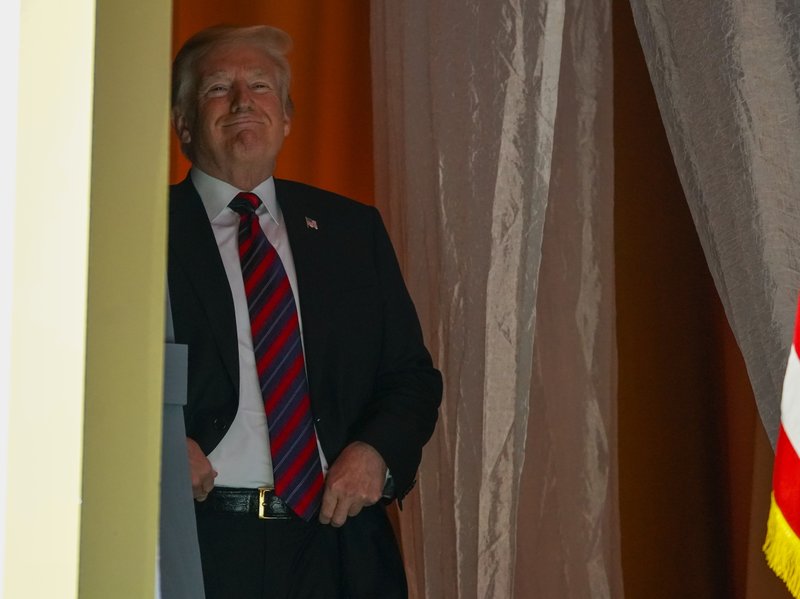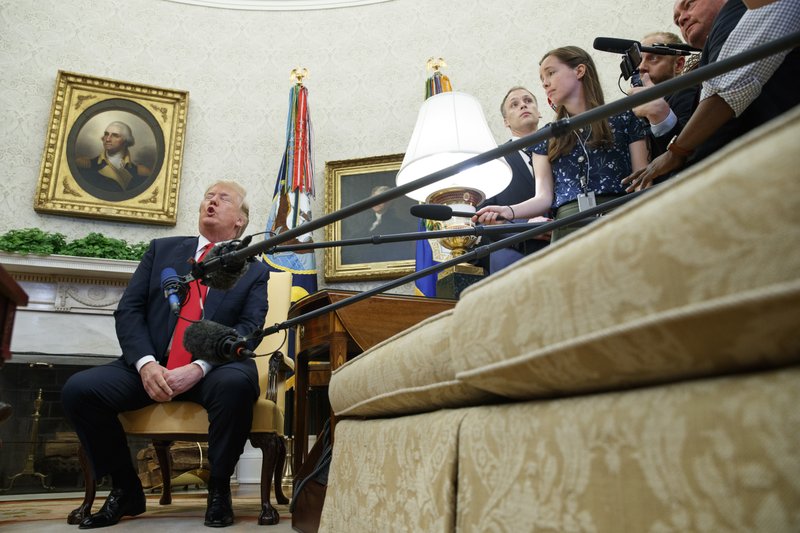On Long Island, Donald Trump to speak on immigration, gang violence

President Donald Trump will hold a roundtable discussion on Long Island on illegal immigration and gang violence that the White House is calling a “national call to action for legislative policy changes.” White House spokesman Hogan Gidley says the discussion with law enforcement and local leaders will focus on “immigration loopholes” that he said allows the violent MS-13 gang “to infiltrate our communities.” MS-13 has been blamed for some two dozen killings on Long Island the past two years. Trump has used the violence to bolster the urgency of his push to overhaul the nation’s immigration laws, as well as the need to build a border wall with Mexico and enact tougher travel restrictions. He’s also argued for loosening restrictions on law enforcement, encouraging police officers whom he calls “rough guys.” “Please don’t be too nice,” he told law enforcement officials in a similar trip he made to Long Island last July. Trump will also attend a fundraiser in his hometown of New York City on Wednesday evening. The 75-person dinner is expected to raise $5 million for the Republican National Committee and the president’s re-election campaign, the RNC said. Last week, Trump used the word “animals” to describe some people who enter the country illegally, in response to a comment about MS-13. The president says he will continue to use the term in referring to the gang. The White House also released a fact sheet Monday morning titled “WHAT YOU NEED TO KNOW ABOUT THE VIOLENT ANIMALS OF MS-13.” MS-13, or the Mara Salvatrucha, is believed by federal prosecutors to have thousands of members across the U.S., primarily emigrants from Central America. It has a stronghold in Los Angeles, where it emerged in the 1980s as a neighborhood street gang, but it also has wreaked violence in cities and suburbs across the U.S., including Long Island. The president has called for an end to “catch-and-release” policies, which generally refers to the release of unauthorized immigrants while they await immigration hearings instead of keeping them in custody as well as changes ro rules governing minors and asylum seekers. Gidley claims the policies “allow hundreds of thousands of illegal and unauthorized aliens to gain entry and release in the United States” and says they can be exploited by violent gangs, cartels, and drug dealers. Many teenagers on Long Island have been held on gang accusations, swept up in various federal investigations. But Immigration advocates say some teenagers arrested in the crackdowns in New York and California have been unfairly tied to gangs and wrongly held at detention centers. Republished with the permission of the Associated Press.
‘Animals’? Donald Trump says he’ll keep using term for gang members

President Donald Trump is defending his use of the word “animals” to describe some immigrants who enter the country illegally, saying he would continue to use the term to refer to violent gang members despite a sharp rebuke from Democratic leaders. Answering a reporter’s question during a meeting Thursday with NATO Secretary-General Jens Stoltenberg, Trump said his comment a day earlier had clearly been directed at members of the MS-13 gang. “MS-13, these are animals coming onto our country,” Trump said, repeating his language from Wednesday. “When the MS-13 comes in, when the other gang members come into our country, I refer to them as animals. And guess what? I always will.” Trump has been under fire for comments he made Wednesday while railing against California for its so-called sanctuary immigration policies. Trump was speaking at a roundtable with local California officials when he responded to a comment that had referenced MS-13. “We have people coming into the country, or trying to come in — and we’re stopping a lot of them,” Trump said after Fresno County Sheriff Margaret Mims complained about state restrictions that limit cooperation with federal immigration authorities. “You wouldn’t believe how bad these people are. These aren’t people. These are animals.” Trump has repeatedly referred to members of the violent street gang as “animals” in speeches, rallies and at White House events. He has also used the term to describe terrorists and school shooters. Senate Minority Leader Chuck Schumer, D-N.Y., responded on Twitter to the president, saying, “When all of our great-great-grandparents came to America they weren’t ‘animals,’ and these people aren’t either.” And House Minority Leader Nancy Pelosi, D-Calif., said, “Every day that you think you’ve seen it all, along comes another manifestation of why their policies are so inhumane.” Homeland Security Secretary Kirstjen Nielsen said on Friday that lawmakers who criticized Trump for using the word owe the president an apology. “Here you have elected members of Congress pretending that he’s talking about something entirely different. It’s dangerous, it’s inappropriate and frankly, it’s just unprofessional,” Nielsen said on “Fox and Friends.” But White House press secretary Sarah Huckabee Sanders defended the president’s comments, arguing the word “animals” didn’t go far enough. “This is one of the most vicious and deadly gangs that operates by the motto of, ’Rape, control and kill,’” she said. “If the media and liberals want to defend MS-13, they’re more than welcome to. Frankly, I don’t think the term that the president used was strong enough.” Trump was joined at Wednesday’s White House meeting by mayors, sheriffs and other local leaders from California who oppose the state’s immigration policies and who applauded his administration’s hard-line efforts. “This is your Republican resistance right here against what they’re doing in California,” said Assemblywoman Melissa Melendez, co-opting a term used by Democrats opposed to Trump’s presidency. She, like others, said the president and his policies were far more popular in the state than people realize. They were criticizing legislation signed into law last year by Democratic Gov. Jerry Brown that bars police from asking people about their immigration status or helping federal agents with immigration enforcement. Jail officials can transfer inmates to federal immigration authorities if they have been convicted of one of about 800 crimes, mostly felonies, but not for minor offenses. Brown insists the legislation, which took effect Jan. 1, doesn’t prevent federal immigration officials from doing their jobs. But the Trump administration has sued to reverse it, calling the policies unconstitutional and dangerous. Some counties, including San Diego and Orange, have voted to support the lawsuit or have passed their own anti-sanctuary resolutions. Republicans see backlash to the law as a potentially galvanizing issue during the midterm elections, especially with Trump’s anti-immigrant base. And Trump has held numerous events in recent months during which he’s drawn attention to California’s policies. During the session, Trump thanked the officials, saying they had “bravely resisted California’s deadly and unconstitutional sanctuary state laws.” He claimed those laws are forcing “the release of illegal immigrant criminals, drug dealers, gang members and violent predators into your communities” and providing “safe harbor to some of the most vicious and violent offenders on earth.” Brown responded on Twitter, writing that Trump “is lying on immigration, lying about crime and lying about the laws of CA.” The governor added: “Flying in a dozen Republican politicians to flatter him and praise his reckless policies changes nothing. We, the citizens of the fifth largest economy in the world, are not impressed.” Republished with permission from the Associated Press.


